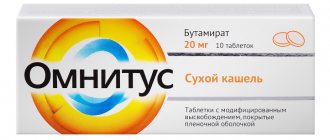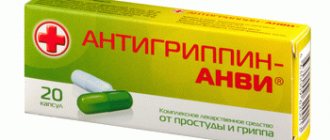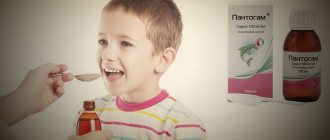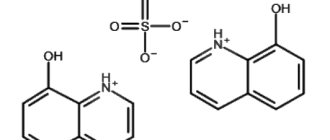Compound
The drug is produced in the form of tablets containing 500 mg of mefenamic acid + methylcellulose, magnesium stearate, potato starch, croscarmellose sodium, octadecanoic acid.
The medicine is also sold in capsules of 250 or 500 mg of mefenamic acid + talc, lactose monohydrate, corn starch, colloidal silicon dioxide, crospovidone, sodium lauryl sulfate, crospovidone.
Another product can be purchased in the form of a powder for preparing medicines.
Pharmacodynamics and pharmacokinetics
The active ingredient of the drug is an anthranilic acid , belongs to the group of NSAIDs and antirheumatic drugs. Thanks to its chem. properties have analgesic, anti-inflammatory, antipyretic effects.
The drug is able to reduce the intensity of the body's production of specific inflammatory mediators - serotonin and prostaglandins . The drug affects both the processes occurring in the periphery and the central mechanisms of increasing pain sensitivity, reduces the activity of lysosome proteases .
Mefenamic acid stabilizes protein ultrastructures and cell membranes, relieves swelling and reduces capillary permeability.
The antipyretic effect of the drug is due to the ability of the acid to influence the thermoregulation center in the brain and reduce the synthesis of inflammatory mediators.
The drug also has a moderate antiviral effect, stimulating the production of interferon , increasing the content of T helper cells and T lymphocytes .
3 hours after oral administration, the active substance reaches its maximum concentration in the blood . There is a linear relationship between the dose taken and the concentration of the drug in the blood plasma . The drug binds very well to proteins and undergoes metabolic in the liver.
The half-life ranges from 120 to 240 minutes. The product is excreted in feces and urine.
pharmachologic effect
Mefenamic acid is characterized by antipyretic, anti-inflammatory and analgesic properties.
- The antipyretic effect is explained by its ability to reduce the production of prostaglandins and influence the thermoregulation center.
- The anti-inflammatory effect is provided by its ability to inhibit the synthesis of serotonin and prostaglandins, which play an important role in inflammation.
- The analgesic effect occurs due to its influence on the peripheral and central mechanisms of pain sensitivity.
The pharmacological effect of the drug is due to its ability to increase the activity of T-lymphocytes, which play an important role in the functioning of the immune system, thereby stimulating the production of interferon and providing an anti-inflammatory effect.
After oral administration, the maximum concentration of the active substance in the blood plasma can be observed after 2-4 hours. As for the half-life of this medication, it is about 3 hours. Approximately 70% is excreted in urine and the rest in feces.
Indications for use
The drug has a fairly wide range of applications:
- acute respiratory infections , viruses , influenza ;
- diseases of the musculoskeletal system , rheumatism , rheumatoid arthritis , ankylosing spondylitis ;
- primary dysmenorrhea and dysfunctional menorrhagia ;
- pain, swelling , inflammation after operations and injuries.
Mefenamic acid also prescribed for fever and fever .
Analogues of the drug
It is not so easy to find analogues of Mefenamic acid in Russia, since the drug is produced in small quantities and is not distributed in all regions. The following are considered the best substitutes:
- The drug Mefenaminka is available in tablet form and has a similar composition, as well as pharmacological properties. Helps to quickly reduce body temperature, eliminate acute symptoms of pathologies of the musculoskeletal system, headaches and other disorders. Prescribed for adults and children over 14 years of age. Courses are usually short and do not exceed 14 days. The drug is contraindicated in patients with severe forms of allergies, peptic ulcers, and gastritis.
- Amifena is an effective drug that contains mefenamic acid. It has a pronounced anti-inflammatory, analgesic and antipyretic effect. Allowed for use by adults and children over 5 years of age. Used for the treatment of pathologies of the spinal column, joints, influenza, respiratory and viral diseases. Not prescribed during lactation and pregnancy, patients with aspirin asthma or allergies to the components of the drug.
- Ibuprofen is a popular medicine that has a different composition, but has a similar effect on the human body. Prescribed for adults and children, it helps cope with acute clinical manifestations of colds and viral diseases, arthritis, rheumatism, radiculitis, gout. Not used for severe pathologies of the gastrointestinal tract, respiratory system, or hematopoietic disorders. Strictly contraindicated during pregnancy and lactation.
Despite the fact that all analogues of the pharmacological drug have a similar effect, it is not recommended to use them independently or replace the original medication.
Contraindications
The product is contraindicated:
- if you are allergic to its components;
- if after taking Aspirin or other NSAIDs the patient develops Quincke's edema , runny nose , bronchospasm , urticaria or bronchial asthma ;
- combine with specific COX-2 inhibitors ;
- with a stomach or duodenal ulcer , including a history of it;
- pregnant and lactating women;
- for inflammatory bowel diseases, diseases of the hematopoietic organs;
- children under 5 years old;
- if the patient suffers from severe heart failure, liver or kidney disease;
- with perforation or gastrointestinal bleeding.
The medicine is prescribed with caution to patients with epilepsy , arterial hypertension , coronary heart disease , systemic lupus erythematosus , ulcerative colitis and Crohn's disease (with a history).
Elderly people are at risk; their likelihood of developing side effects increases significantly.
Who is this medicine contraindicated for?
In some cases this medication should not be used:
- Mefenamic acid should not be taken if you are hypersensitive to the components of the product.
- This medicine is prohibited for use in cases of gastric ulcers and inflammatory processes in the intestines.
- It should not be prescribed for severe blood diseases, serious pathologies of the liver and kidneys.
- Children under five years of age should not take this medicine.
- The drug should not be used during pregnancy or breastfeeding. The medicine increases the heart rate of the unborn baby.
- The medication should not be taken by women who are planning to become pregnant in the near future, since after its use problems with conception may appear.
Side effects
Mefenamic acid may cause:
- drowsiness , weakness, irritability, headaches , convulsions , blurred vision;
- pain in the abdomen or stomach, nausea, increased gas formation , vomiting;
- increased levels enzymes ;
- colitis , heartburn , enterocolitis , hepatitis , jaundice , pancreatitis ;
- increased blood pressure , arrhythmia ;
- gastritis , peptic ulcers without bleeding or with bleeding, constipation , diarrhea ;
- dyspnea , bronchospasm ;
- skin rashes, peripheral edema, angioedema , Stevens-Johnson syndrome , urticaria , photosensitivity , asthma , anaphylaxis ;
- rarely - congestive heart failure, peripheral , palpitations, shortness of breath ;
- capillary necrosis , polyuria ;
- aseptic meningitis glucose tolerance in patients with diabetes mellitus ;
- cystitis , dysuria , hematuria , renal failure , nephrotic syndrome ;
- aplastic anemia , decreased blood clotting, leukopenia , thrombocytopenia , agranulocytosis , pancytopenia , neutropenia ;
- hyponatremia , hyperkalemia , glomerulonephritis ;
- ringing in the ears, loss of color vision (reversible), eye irritation.
What can you say about side effects?
Mefenamic acid causes adverse changes in the body's digestive system. Often when using the drug, abdominal pain, diarrhea and nausea occur. The drug can cause internal bleeding, stomach ulcers, and pancreatitis. It often increases the level of liver enzymes in the blood. Acid also affects the body’s hematopoietic system: it can lead to anemia and thrombocytopenia. This medication may increase blood pressure and change heart rhythm. In rare cases, after taking the medicine, heart failure develops and edema appears.
Instructions for Mefenamic acid (method and dosage)
The medicine is prescribed orally, after meals.
It is not advisable to split the capsules; it is better to swallow them whole.
Adults are usually prescribed 250 or 500 mg of the drug 3-4 times a day. The maximum daily dosage is 3 grams. As a rule, after achieving the desired effect, the daily dosage is reduced to one gram.
The course of treatment is determined by the attending physician. For example, for fever or for the treatment of pain, the duration of therapy is up to 7 days. The course of treatment for joint diseases ranges from 20 to 60 days.
Instructions for Mefenamic acid for children
The drug should not be prescribed to children under 5 years of age.
The dosage for children aged 5 to 12 years should not exceed one gram. As a rule, take 250 mg 3 or 4 times a day.
The course of treatment is determined by the doctor.
Overdose
In case of overdose, the following are observed: abdominal pain, drowsiness , nausea, vomiting, gastrointestinal bleeding , respiratory depression, convulsions, decreased blood pressure , coma .
The medicine does not have a specific antidote . Treatment options include gastric lavage, enterosorbents , forced diuresis , and urine acidification. Hemodialysis is ineffective.
Interaction
Antihypertensive drugs and ACE inhibitors , when combined with this drug, lose their ability to lower blood pressure .
When combining the drug with Thiamine , Pyridoxine Phenothiazine derivatives , caffeine , narcotic analgesics , Diphenhydramine or barbiturates analgesic effect increases .
Fluoroquinolones increase the risk of seizures, aminoglycosides and tacrolimus - nephrotoxicity.
The medicine increases the toxicity of Methotrexate .
The combined use of the drug with cardiac glycosides can increase the degree of heart failure and increase the level of glycosides in the blood.
Diuretics and Cyclosporine increase the nephrotoxicity of mefenamic acid , and the diuretic effect of diuretics .
The interval between taking Mifepristone and Meph. acid should be at least 8-12 days.
When combining the drug with corticosteroids , selective serotonin reuptake inhibitors or antiplatelet agents, the risk of gastrointestinal bleeding and perforation .
Caution should be used when combining the medicine with lithium , zidovudine , oral anticoagulants , and other NSAIDs .
special instructions
In case of skin rashes, damage to the mucous membrane or other manifestations hypersensitivity reactions , discontinue use and consult a doctor.
Taking the drug can cause fertility in women, so it should not be prescribed to women who are trying to conceive a child.
While taking the medicine, it is best to refrain from driving or operating machinery.
In order to reduce the likelihood of developing side effects from the gastrointestinal tract, it is recommended to take tablets or capsules with milk.
Application Features
The drug is prescribed with caution to patients with acute cardiovascular failure, arterial hypertension, and coronary heart disease.
The drug is prescribed with caution to patients with epilepsy.
Mefenamic acid should not be used in patients who have previously experienced hypersensitivity reactions, such as asthma, bronchospasm, rhinitis, angioedema or urticaria.
Do not use in dehydrated patients who have lost fluid due to vomiting, diarrhea, or increased urination.
For long-term treatment of headaches, you should consult your doctor.
For moderate impairment of liver or kidney function, there are no special recommendations for the use of the drug.
NSAIDs should be taken with caution in patients with a history of gastrointestinal diseases (ulcerative colitis, Crohn's disease), since exacerbation of the disease is possible. If the use of mefenamic acid leads to gastrointestinal bleeding and perforation, treatment should be discontinued.
Elderly patients generally have an increased risk of developing gastrointestinal side effects, especially gastrointestinal bleeding and perforation, which can be fatal, so treatment should be started at the lowest dosage.
Patients with systemic lupus erythematosus and mixed connective tissue diseases are at increased risk of aseptic meningitis.
Mefenamic acid should be used with caution in patients at high risk of serious skin reactions, including exfoliative dermatitis, Stevens-Johnson syndrome, and toxic epidermal necrolysis. Mefenamic acid should be discontinued at the first appearance of skin rash, mucosal damage, or any other manifestation of hypersensitivity.
With long-term use of the drug, it is necessary to monitor blood counts, since mefenamic acid can cause pathological changes in the blood. If manifestations of any dyscrasia occur, drug therapy should be discontinued.
Taking mefenamic acid may cause gastrointestinal problems (eg diarrhea). They can occur either immediately after using the drug or after long-term use. If such symptoms occur, you must stop using the drug.
Caution should be exercised when using mefenamic acid in patients receiving therapy with drugs that increase the risk of bleeding: corticosteroids, anticoagulants (warfarin) and aspirin.
Taking mefenamic acid may impair female fertility and is not recommended for women who are trying to become pregnant. When used by women with symptoms of dysmenorrhea and menorrhagia and the absence of a therapeutic effect, it is necessary to consult a doctor.
Use during pregnancy or breastfeeding.
The drug is not used by women during pregnancy or breastfeeding.
The ability to influence the speed of reactions when driving vehicles or other mechanisms.
Caution should be exercised when driving vehicles or operating machinery that requires increased attention, as sometimes the use of the drug can cause drowsiness, blurred vision, and convulsions.
Reviews about Mefenamic acid
There are good reviews about the medicine on the Internet. It quickly and permanently brings down the temperature, does not cause adverse reactions, and has antiviral activity. Many are satisfied with the low cost of the drug.
Reviews about the medicine:
“My child is often sick. Mefenamic acid is the only thing that helps us. I give it probably from the age of 4, now the child is 8 years old”;
“I always have a place in my medicine cabinet for the anti-inflammatory drug Mefenamic acid. This medicine often helps out when there is a high fever that needs to be brought down quickly, and it helps with the first symptoms of a cold or flu. It is easily tolerated and does not cause discomfort during use”;
“My oldest boy is 10 years old, we have been saving him since he was 5. The tablets reduce the temperature within 1 hour. I am glad that such a drug exists; not a single suppository or tablet helped us, only Mefenamic acid saved us. Now I always keep it in stock at home.”
Doctor Komarovsky's opinion
A well-known pediatrician does not recommend using Mefenamic acid in the treatment of children. The pediatrician believes that this medicine is highly effective and quickly reduces fever. But the drug contains a large amount of harmful substances, so many developed countries have abandoned the use of this drug as an antipyretic.
Komarovsky writes that to reduce the temperature it is better to use Paracetamol and Ibuprofen. These medicines meet all the necessary requirements. They are effective and suitable for treating young patients.
Mefenamic acid price
The price of tablets with mefenamic acid is approximately 50 UAH for 20 pieces, with a dosage of 500 mg. The cost of capsules is 60 UAH for the same amount of medicine.
- Online pharmacies in RussiaRussia
- Online pharmacies in UkraineUkraine
LuxPharma* special offer
- Mefenamic acid (Mefenaminka) tab.
500 mg N20 RUB 1,380 order
show more
Pharmacy24
- Mefenamic acid-Darnitsa 500 mg N20 tablets PrAT" Pharmaceutical company "Darnitsa", Ukraine
46 UAH. order - Mefenamic acid 250 mg N20 capsules Flamingo Pharmaceuticals Ltd, India
40 UAH order







